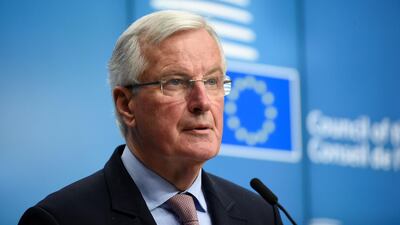The crescendo of noise that accompanies the British drive to leave the European Union stretched around the continent Tuesday as Brussels officials prepared to publish the draft treaty that will set terms for London’s exit.
The EU chief negotiator Michel Barnier acknowledged that a number of outstanding issues remained unresolved even as the 120-page document went to print, admitting there had been little real progress in fleshing out terms since December.
One key flashpoint is the length of the transition period between the British exit in March next year and the loss of its current access to the European economy. While Whitehall officials have demanded at least two full years, Mr Barnier wants it to end in 2020. “It must be short, it must be clearly specified in time, and this is clearly the line that we are pursuing and if there are no issues, so much the better. This is one of the points where we see an area of divergence with the UK,” he said.
In the absence of clear consensus on the future trade ties between Britain and the EU, Brussels has also set out three options that would preserve an open and free border in Ireland. However the option C outlined has been criticised by Brexit-supporting British politicians as an “intolerable interference” because it would effectively require customs checks on trade between Northern Ireland and Great Britain.
_______________
Read more:
Unilever's likely London exit stokes Brexit concerns
UK government to counter Labour support for Brexit customs union
_______________
Within British politics a stark divide has emerged over the future free trade deal after the leader of the opposition Labour party Jeremy Corbyn threw his weight behind an alternative customs union with the EU. The government says a customs union would preclude wide-ranging free trade pacts with economic partners around the world.
A retired senior civil servant, who helped set up the International Trade department after the Brexit vote in 2016, Martin Donnelly warned on Monday that Britain was abandoning more than it could gain from new deals. “You’re giving up a three-course meal, the depth and intensity of our trade relationship across the European Union and partners now, for the promise of a packet of crisps in the future, if we manage to do trade deals in the future outside the EU which aren’t going to compensate for what we’re giving up,” he said.
The Brexit-supporting International Development Secretary Liam Fox said that Mr Donnelly was stuck in the past and had failed to recognise the potential gains from structural changes in the world economy. “It is unsurprising that those who have spent a lifetime working within the European Union would see moving away from the European Union as being threatening,” he said. “The particular choice that I heard Sir Martin Donnelly outline was a choice between the European Union and trade opportunities elsewhere.
“I don’t believe that is the choice we face. And, in any case, I think the UK Brexit process is, as we have all discovered, a little more complex than a packet of Walkers.”
However Emmanuel Macron, the French president, said the option of a customs union remained a potential outcome, comparing its status as akin to Turkey’s arrangement with the EU.
“Let me just say that a customs union would be the Turkish solution,” said Mr Macron. “It’s a possible option. But it has constraints. Let’s be clear that it’s not full access to the single market. That’s the Norwegian solution, but that involves accepting the four freedoms and contributions to the budget. It’s very different to what exists between Turkey and the EU.”
London was also under pressure from the devolved regional governments with the Scottish leader Nicola Sturgeon warning that Edinburgh would vote down parts of the deal if it lost powers in the shift away from Brussels.
“I will not sign up to something that effectively undermines the whole foundation on which devolution is built and no first minister, no Scottish government worth its salt, should do so.”

